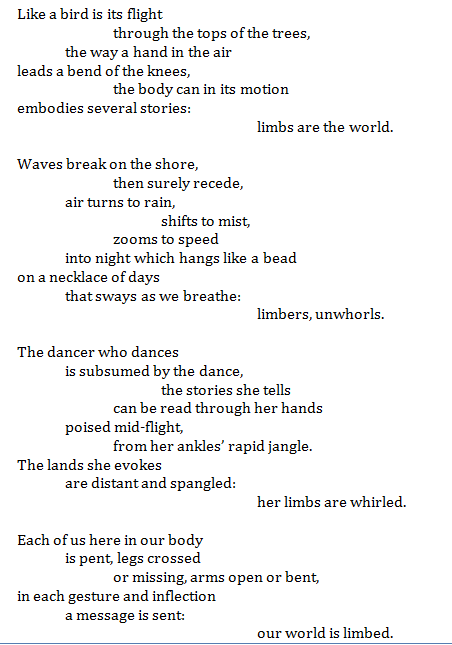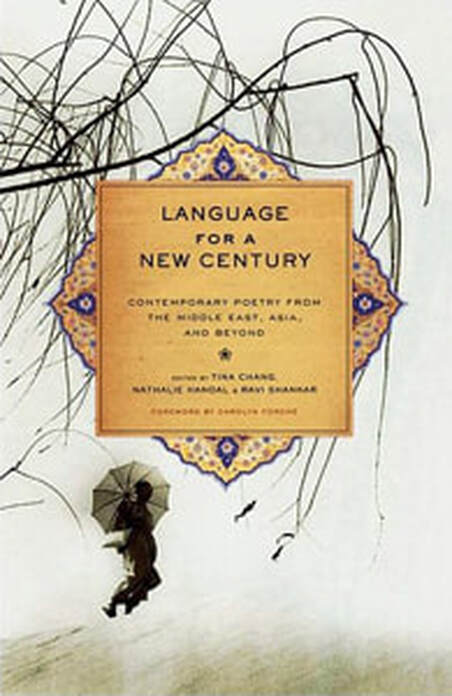Sunday, November 27, 2022
Ravi Shankar
Exile
There's nowhere else I'd rather not be than here,
But here I am nonetheless, dispossessed,
Though not quite, because I never owned
What's been taken from me, never have belonged
In and to a place, a people, a common history.
Even as a child when I was slurred in school -
Towel head, dot boy, camel jockey -
None of the abuse was precise: only Sikhs
Wear turbans, widows and young girls bindus,
Not one species of camel is indigenous to India . . .
If, as Simone Weil writes, to be rooted
Is the most important and least recognized need
Of the human soul, behold: I am an epiphyte.
I conjure sustenance from thin air and the smell
Of both camphor and meatloaf equally repel me.
I've worn a lungi pulled between my legs,
Done designer drugs while subwoofers throbbed,
Sipped masala chai steaming from a tin cup,
Driven a Dodge across the Verrazano in rush hour,
And always to some degree felt extraneous,
Like a meteorite happened upon bingo night.
This alien feeling, honed in aloneness to an edge,
Uses me to carve an appropriate mask each morning.
I'm still unsure what effect it has on my
Ravi Shankar
Spangling the Sea
Ruffle and tuck, river fabric wags doggedly towards ocean,
Heaping surface on surface, its cadence a gown.
Perpetually beneath lurks stillness, a calm inseam sewn
By handless needles, distinct from yet part of the sequined
Design that glints iridescent now, then dark as pine.
Between silt and waver live many denizens of the deep:
Zigzagging shiners, freshwater drums, tessellated darters,
Grass carp, a kaleidoscopic plenitude that yaws and rolls
Among root wads and bubble curtains drawn on riparian
Terraces, hinged vertebrae whipping back and forth
In an elastic continuum displacing the fluid milieu,
Enabling them, polarized or not, to scull along in schools.
Nothing in outer space so bizarre as episodes underwater:
The gilled emerge from bouts of massive oviparity
Staged upon plankton columns where some fry turn larval
While the majority never leave the sure rot of egg sleep.
Whether due to snowmelt in mountainous headwater tracts
Or to rainfall from cumulonimbus fancy, for whatever reason
Water appears from serpentine soil and prairie-scrub mosaic,
A small muddy trickle that gains momentum as it swells
And deepens, sweeping along twigs, carcasses, bald tires,
To empty at length into estuaries engulfed by tides
Perpetually born of a body dressed in hastening garb,
Upholstering two-thirds more surface than any ground.
Ravi Shankar
Contraction
Honest self-scrutiny too easily mutinies,
mutates into false memories
Which find language a receptive host,
Boosted by boastful embellishments.
Self-esteem is raised on wobbly beams,
seeming seen as stuff enough
To fund the hedge of personality,
Though personally, I cannot forget
Whom I have met and somehow wronged,
wrung for a jot of fugitive juice,
Trading some ruse for a blot or two,
Labored to braid from transparent diction
Fiction, quick fix, quixotic fixation.
As the pulse of impulses
Drained through my veins, I tried to live
Twenty lives at once. Now one is plenty.
Friday, November 25, 2022
Dan Chiasson
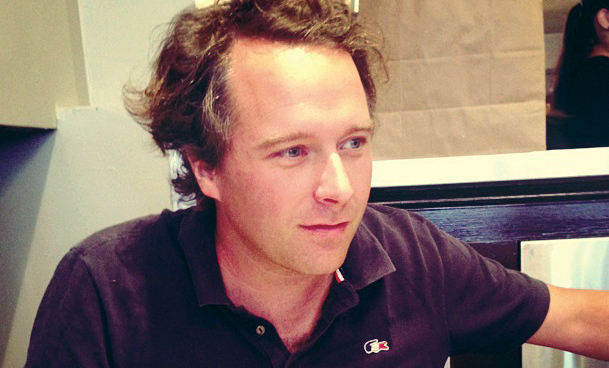
Bloom
Mural, David Teng Olsen, 2017
Through his eyes I see in the dark. I see through change the static.Night says to day, You do you, then emerges bright as a peacock,its black drapery embroidery smiley faces looking vaguely smashed.Day had a state-of-the-art screen accentuate each pixelated daisy.You could kill the backlit spectacle and use it as a mirror of the starsor take the comfort on its merits. Tomorrow will be worse, it cooed.Dave put a feeding tube up where the sun don't shine, the moongoing, Did you have to? Did you? then smiling to show it didn't mind.Louis had the breakthrough moment on what looked to be a pizza slice:It's the cover of your book, he said— Dad, it's the cover of your pizza book—
Wednesday, November 23, 2022
Anthony Madrid
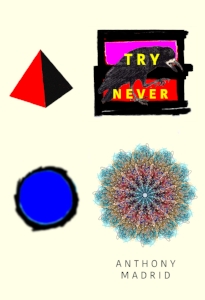
from Stepping Crow
Stepping crow. Moon at half mast.
Dawn horse, horse, blanket and mule.
The fool knows something you don’t.
Stepping crow. Both feet in the boat.
Books stacked up, and nowhere to store ‘em.
Decorum is spontaneous order.
Stepping crow. Gone north of the Border.
Magic in motion and magic at rest.
Only divest, no need to announce it.
Stepping crow. Locked in from the outset.
Feet in the boat and we’re already rowing.
I don’t like thinking, I like already knowing.
Sunday, November 20, 2022
Anthony Madrid
I Shall Sit Atop Olympus
I SHALL sit atop Olympus; I shall juggle dying worlds.
I shall trifle with Great Hatreds and toy with Young Love.
So, let the girl from Rose Apple Tree Island bring her famous box of paints.
Let her set to work with her single-haired paintbrush on the living face of the Queen.
Not for nothing do we maintain this race of bird-eating royal spiders.
Each precious abdominal hair follicle has its place in the Cosmetic Scheme.
Behold our palace foreman, wise in the ways of pleasure. He has a belt with a
Wheel of revolving dildos, like the lens turret on a microscope.
And when our scientific equipment fails us, we punish it with a hammer!
In the case of our most advanced equipment, we have to use a jeweler’s hammer.
In my culture, we know the outsiders by the fact they can’t answer our riddles.
“Father’s in the room; his beard is outside” is a ready-to-hand example . . .
But to sharpen his carpenter’s pencil, Madrid al -Katib has no need of a knife.
He just sticks it in his mouth and sucks. One suck and it’s sharp as a needle.
Anthony Madrid
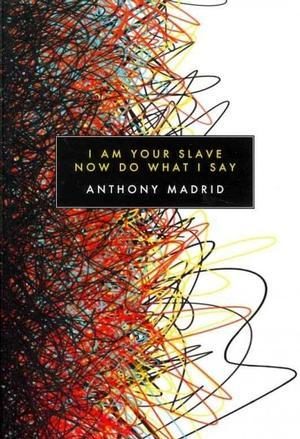
It Is with Words as It Is with People
Anthony Madrid

from Statement. Poetry Society of America
APHORISM: Poets all write what they want, but they don't all write what they want to read.
Now, what would happen if we started teaching people to write what they actually want to read? That's easy. We'd all be ankle-deep in a bog of inert and unoriginal gunk—which is to say: things would be mainly like they are now, the key difference being that the level of pretense would be lower. And would that really be any better?
Yes. Because, the way we do things now, most poets please nobody, not even themselves—whereas, if everyone were taught to write what they themselves wanted to read, then quite a few people, hidden away and operating in harmless isolation, would be getting off on poetry, every day.
In a few exceptional cases—ones similar to my own—a poet would generate masses of immature and irresponsible lyrics, honestly seeking to please nobody but herself, and every last one of those lyrics would be truly delightful to its maker and useless to everyone else except for a few perverts, and the lyrics would find their way to those perverts, and some measure of inoffensive success might be achieved.
At any rate, this is what I intend to teach my students, next time I have any. Do the legwork, find out what you like to read. If what you really like to read is a bunch of descriptions of wieners and kwungamungas, write that. Be as deep as you are—or as shallow. Write about bees. Think hard about Dickinson, her integrity.
Anthony Madrid

Like a Cloud above a Ravine
John Ashbery

In sooth, I come here sadly,
not trembling, not against my will,hoping you will set the record straight.
You can, you know, in a minute
if the wind is right and no felon intervenes.
And we sit and you tell me how crazy I am.
I shall petition the other board members
but am afraid nothing will ever come right.
It has been going on too long for this to happen,
yet it was right to go, to go on as it did,
even if there was a strangeness in the rightness
that no one can see now. They see the night
in its undress, plaits unplaited, brushed,
the sound of the surf churning on distant rocks,
can think only about how heavenly it would have been
if it had all happened later of differently.
Now, according to some sources,
new golfing trends are a commodity,
along with silence, and sweetness.
Doucement, doucement . . .
And when the sweetness is adjusted,
why, we’ll know more than some do now.
That is all I can offer you,
my lost, my beloved one.
Nin Andrews

Poets on Poets
notes from AWP
—I’m pretending not to see him so I can eat my lunch.
—But who reads that shit? About as true to life as a
velvet grape.
—I think he judges poetry with his dick. And poets, too.
—What’s the scoop on her? Is that her husband, or is he
just hanging out in her hotel room for the duration?
—Personally I prefer not to think about his dick.
—His latest work, especially the poems about his dead father,
begin to sound human.
—Think of it as a conductor’s baton.
—Granted, she wins all the prizes, but talk about grandiose.
—The latest inductee into the goddess cult. Like back in the
sixties when sex and war were the metaphors for
consciousness-raising.
—I bet they’re really confessional, and she’s a total
pervert too.
—He knows how to network, who to climb, and when.
Timing is everything.
—Insomnia, maybe chronic fatigue syndrome. I think it’s
just frayed nerves.
—I always admired your work but can’t figure why it’s been
so marginalized.
—You want my phone number?
—The illusion of the narrative appears in your work, but
there’s really a thread of the unspoken narrative, right?
—Are you married? Do you have children?
—Never even answered my inquiries, the pompous bastard.
—That’s really sweet. Thank you.
—I think I have a blindspot when it comes to his work.
—Must be great to get away.
—I don’t know why they don’t just fire the asshole.
—Reminds me of a gilt frame with no picture inside.
—She’s eloquent enough, a nice cocktail poet.
—Did you see what he was wearing?
—She says it’s none of my business what she writes.
—Poetry is a private affair. A kind of masturbation. An
endless self-portrait.
—So what if he is another excellent specimen of the dead
father poets.
—Where are the dead mother poets?
—I like the way you think,
—Yet another vapid, beautiful wind-blown babe-poet for
the cover of APR.
—Let’s go out for a beer somewhere.
—I sure wouldn’t want to live in his skin.
—A local dive would be nice.
—The way I see it, you’re better off not getting famous
too soon.
—I never even send out my work.
Agha Shadid Ali
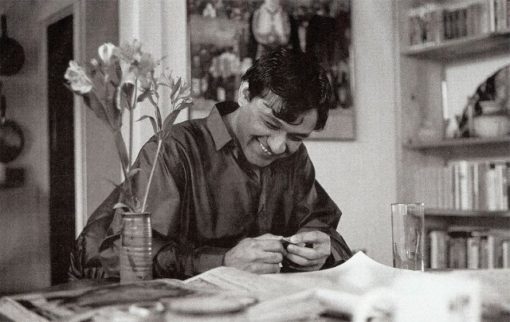
Did we run out of things or just a name for you?
Above us the sun doubles its acclaim for you.
Negative sun or negative shade pulled from the ground …
and the image brought in one ornate frame for you.
At my every word they cry, “Who the hell are you?”
What would you reply if they thus sent Fame to you?
What a noise the sentences make writing themselves—
Here’s every word that we used as a flame for you.
I remember your wine in my springtime of sorrow.
Now the world lies broken. Is it the same for you?
Because in this dialect the eyes are crossed or quartz,
A STATUE A RAZOR A FACT I exclaim for you?
A Ghazal for Michael Palmer
The birthplace of written language is bombed to nothing.
How neat, dear America, is this game for you?
The angel of history wears all expressions at once.
What will you do? Look, his wings are aflame for you.
On a visitor’s card words are arranged in a row—
Who was I? Who am I? I’ve brought my claim. For you.
A pity I don’t know if you’re guilty of something!
I would-without your knowing-take the blame for you.
Still for many days the rain will continue to fall …
A voice will say, “God, I’m burning in shame for You.”
Something like smoke rises from the snuffed-out distance …
Whose house did that fire find which once came for you?
God’s dropped the scales. Whose wings will cover me, Michael?
Don’t pronounce the sentence Shahid overcame for you.
Dan Beachy-Quick

The Jeweler's Solstice, His Madness
I know you, smaller than Circumference
Of Bone—smaller than Orbit—than Silver
Flask in Pocket—more delicate than Mints
On Tongue shrinking into Sweet Breath from Sour.
I know the Summer-stained streets must fill, twice—
With Milk, with Flood—of Moon—and Blight.
I know how the Forest leads its Shallow life
First, to splendor—Jade, Ruby—then Right
Of Dismissal. The Heir, I know. The Emperor
Of Laced Bone made Outlaws of Wrists, Ribs,
Liquor, Hands? Name me: Relief. A Jeweler—
Fashions Clasps to stall a season. Earring Stubs . . .
Now dark Blood pulses through the white Wrist's Gate—
Must forge—from Winter—How—its gemmed Bracelet.
Carrier Pigeon, Anonymity
Retrieve? Ask the bird's claw, bare and riven
Where the message fell, where it diminished—
Where the note filled—a Hand, unbidden . . .
Writing that bore my own hand's mark, vanished?
Result: a wrist smiles weakly, unable to lift.
Result: a tooth grays, a lost tongue, a lisp.
"Consider the knot's weight a loosened threat,"
The Manual said. "Consider the wind, the cusp
Of breath—an objection, an unwinding, a debt."
I left your envelope unsealed. I bought
A tattered wing, a cataract, from a merchant
Of cuttle bones, and birds. Months passed. I thought
You were weakening, ill. I wrote: Why
Does this comfort me so? Signed—no name—Me.
Robert Hass
The Failure of Buffalo to Levitate Millard Fillmore died here. His round body is weighted by marble angels. He lies among the great orator...
